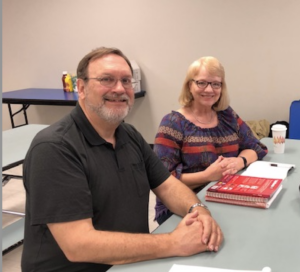
Armin & Karen
How did you first meet Pastor Yadessa and learn about the Multi-Ethnic Ministry?
In the fall of 2020, Armin met Pastor Yadessa at Messiah Lutheran Church in Plano (where we are members) during Messiah’s annual LWML collection and shipping of clothing and kits around the world. Over the next couple of months, Pastor Yadessa asked Armin to be involved in the MEMNT ESL (English as a Second Language) program.
What are your backgrounds? Have either of you taught ESL in the past?
Neither of us had any experience teaching ESL. We do not have an education background. Pastor Yadessa’s skills of persuasion got Amin into teaching ESL! Armin worked as a systems engineer programmer, and I worked most of my career in medical transcriptionist fields.
What has the experience of working with the ESL students meant to you?
Armin: As a Christian who is a life-long Missouri Synod Lutheran, I hear over and over about bringing Christ to the nations. As a boy, I always wondered how we, living in the United States, would be able to take the love of Christ to other countries besides donating money or becoming an overseas missionary. Now God is providing these missionary opportunities in the US! We all have the opportunity to let the light of Jesus shine for refugees and immigrants.
Karen: I became involved in ESL to help Armin because women refugees were more comfortable if a woman helped teach. The women attending ESL classes are shy and very sweet. They very much want conversations in English to learn to speak to others. In the past, I met one of the women for coffee, and currently I am meeting weekly with another lady from Iraq at a local library, where we read stories, work on grammar and sentence structure, and especially practice conversational English. It is amazing how her fluency in English has increased doing this. We have developed a special friendship, and she is trying to get her friends to start coming. We talk about American traditions, families, and have faith-related discussions as well. This one-on-one experience is the best way I’ve found to really talk to the women and get to know them.
What curriculum and class format do you use?
Refugees and immigrants often have difficulty committing to ESL class every week due to many circumstances, so students attend sporadically and can quit suddenly. We have to be very flexible because new students can show up spontaneously at various levels of English proficiency among more experienced students. Some nights, no one will show up. We improvise weekly, using the books we have, internet sources, and at times creating our own materials. One thing we have consistently heard is that students want to have conversational English with us as they often do not have others with whom to practice English. The one-on-one or small numbers approach to become fluent seems very effective.
Are there any supplies that could be donated to support the ESL program?
Supplies, training materials, and facilities are always helpful. We scrape together what we can. We need more volunteers to teach ESL classes. It would be helpful if there were also people who are experience teaching English and/or ESL.
What would you say to other members of your church or community to encourage them to volunteer to serve others through this ministry?
You have the opportunity to reach people with the love of Christ, and we need to stretch beyond our comfort zone, even when it’s not easy or convenient. Pray for an open heart when encountering people from different cultures and languages. Getting to know the people themselves reveals the many ways we are alike, for example the love of our families, hopes for the future, the values of community, and safety concerns.
God is bringing many new people and cultures to the United States. We never know who God is going to put in our path. Jesus’ words from Matthew 9:37-28 hit home, “Then [Jesus] said to his disciples, ’The harvest is plentiful, but the laborers are few; therefore, pray earnestly to the Lord of the harvest to send out laborers into his harvest.’”
